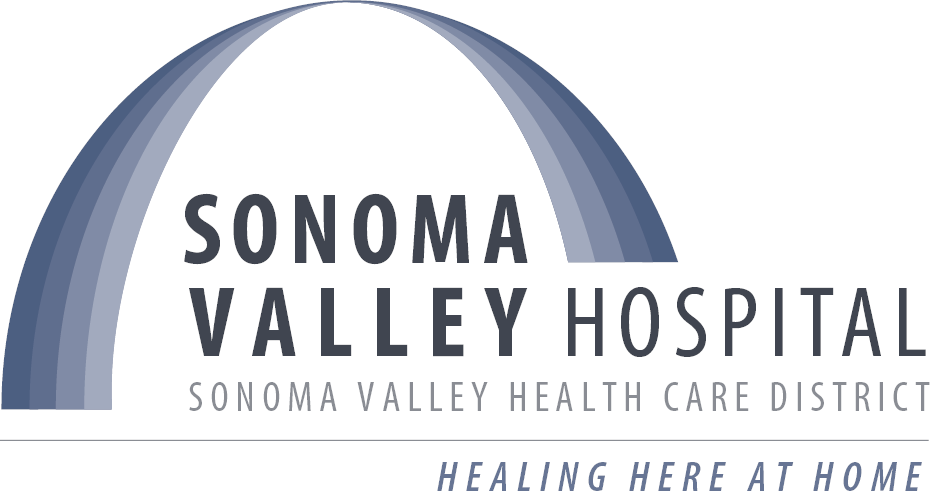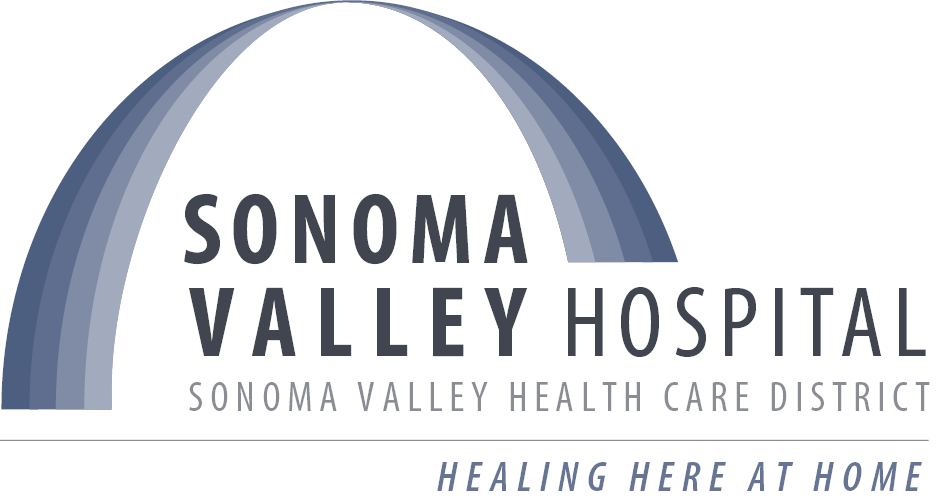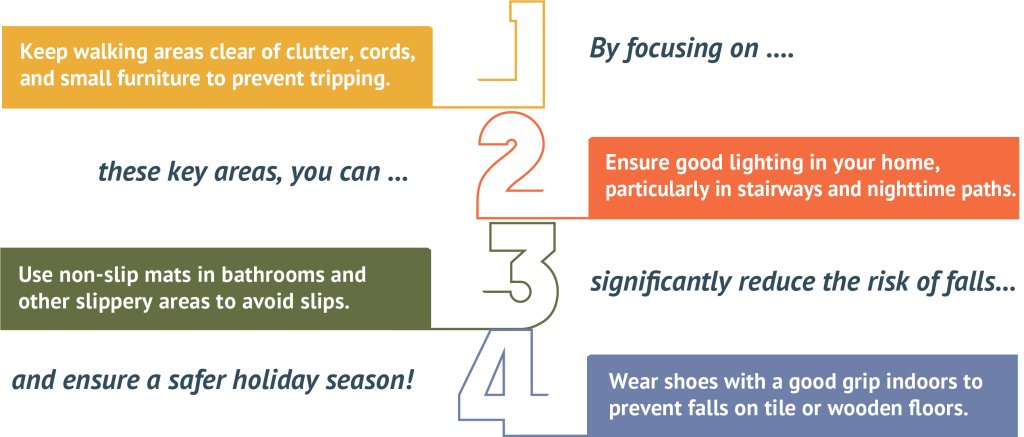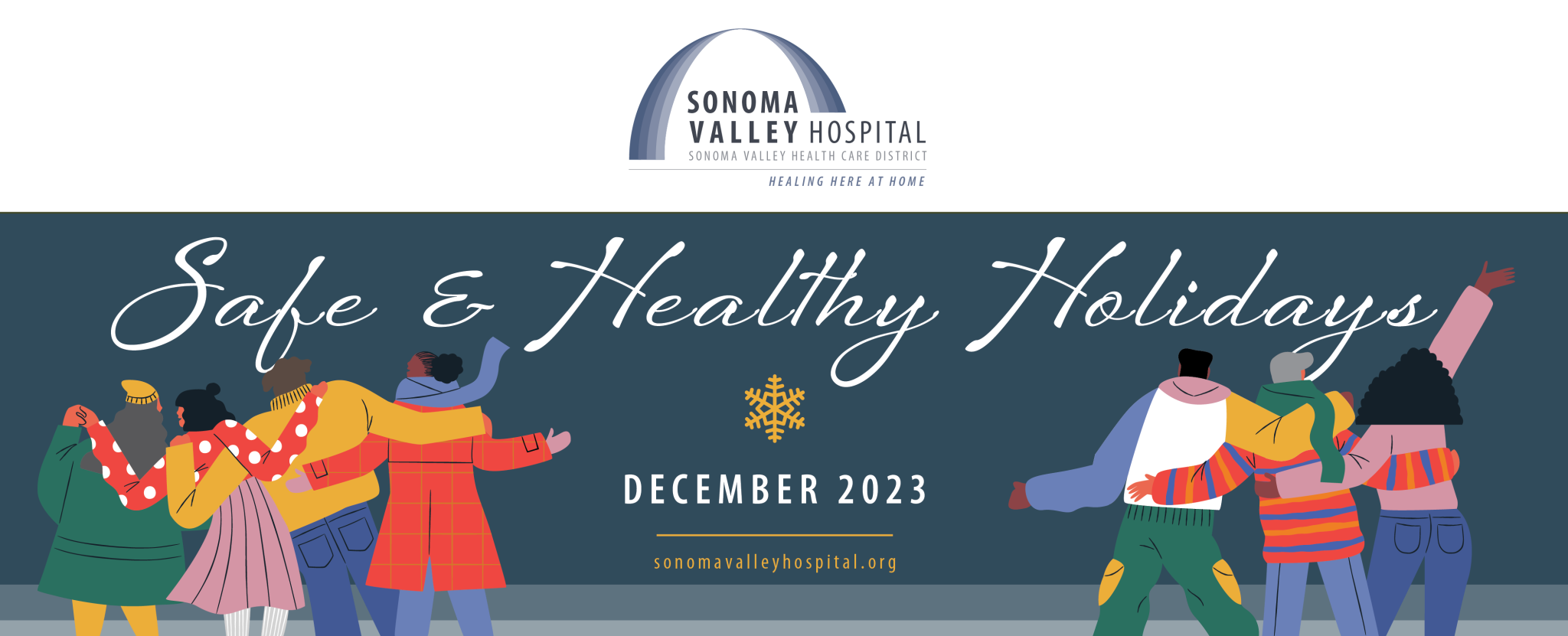
Wishing You a Healthy and Safe Holiday Season!
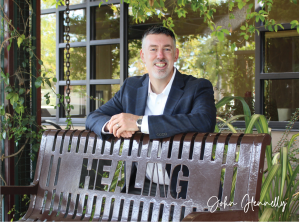 As we approach the festive season of December, I want to extend my warmest wishes for a healthy and safe holiday to each of you. The holidays are a time for joy and celebration, but it’s also crucial to prioritize our health and safety.
As we approach the festive season of December, I want to extend my warmest wishes for a healthy and safe holiday to each of you. The holidays are a time for joy and celebration, but it’s also crucial to prioritize our health and safety.
This month, our focus is on injury prevention and maintaining good overall health. We often see an increase in ER visits during the holidays, many of which involve fall-related injuries, particularly among seniors. To address this, we have our esteemed Medical Director of the ER, Dr. Seric Cusick featured in our “Ask the Expert” section. Dr. Cusick will provide valuable tips to keep you and your loved ones safe and out of the ER this holiday season.
Remember, while we enjoy the festivities, it’s important to be mindful of our health and the safety of those around us. I encourage you to read and share Dr. Cusick’s advice with your family and friends.
As always, Sonoma Valley Hospital is here for our community. We are grateful for the opportunity to serve you and are excited about the work we will accomplish together in the coming year. We have some significant developments to look forward to, including the unveiling of our new MRI facility.
As we close out the year, let’s reflect on our achievements and the strides we have made in serving the Sonoma community. Your health and well-being remain our top priority, and we are committed to being your trusted healthcare provider.
Wishing you all a joyous, healthy, and safe holiday season. Let’s make it a December to remember!
Happy Holidays,
John Hennelly
CEO, Sonoma Valley Hospital
~~~
STAYING HEALTHY OVER THE HOLIDAYS:
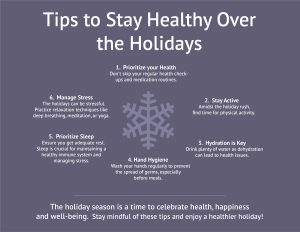 Essential Tips from Stephanie Montecino, Sonoma Valley Hospital’s Infection Prevention Nurse.
Essential Tips from Stephanie Montecino, Sonoma Valley Hospital’s Infection Prevention Nurse.
As the holiday season approaches, it’s important to remember that health and safety should remain at the forefront of our celebrations. Here, Stephanie Montecino, Sonoma Valley Hospital’s Infection Prevention Nurse shares some vital tips to ensure you and your loved ones stay healthy during this festive time.
Meet Stephanie Montecino, a former bedside nurse with 12 years of experience, now a key member of our team at Sonoma Valley Hospital. Stephanie’s journey from a nursing role to an Infection Preventionist/Employee Health Nurse is a story of passion and dedication. After balancing her nursing career with being a mother of three, the Covid pandemic led Stephanie to seek a better work-life balance. Her transition to a Covid drive-through testing role at SVH eventually evolved into her current position, where she recently became Board Certified in Infection Prevention & Epidemiology. Raised by her great grandmother, Stephanie has a special connection with our senior community, driving her commitment to care for Sonoma Valley’s population.
- Prioritize Vaccinations: Begin the season by getting vaccinated against influenza, Covid, and RSV, especially if you are over 60 or immunocompromised. These preventive steps are crucial in safeguarding your health.
- Become Self-Monitoring Experts: It’s essential to listen to your body. If something feels off, it probably is. Don’t ignore changes in your health. Make use of readily available Covid testing and communicate any concerns to your healthcare provider.
- Impeccable Hand Hygiene: Alongside thorough handwashing, use hand gel sanitizer generously. Ensure it’s fully absorbed for maximum effectiveness in killing skin microbes.
- Prioritize Sleep: Ensure you get adequate rest. Sleep is crucial for maintaining a healthy immune system and managing stress. It tends to be the number one thing we give up.
- Mask Up: Wearing a mask, even when it feels unnecessary, can provide an extra layer of protection, especially in crowded or enclosed spaces.
- Avoid Touching Your Face: Our eyes and face are common entry points for viruses. Be conscious of this and keep your hands away from your face.
- Adapt Your Gatherings: If possible, opt for smaller gatherings or outdoor celebrations. This can significantly reduce the risk of virus transmission among your guests.
- Travel Smart: When traveling, consider off-peak hours to avoid crowded conditions. And don’t forget to mask up during your journey.
- Ventilate Your Spaces: Opening windows slightly to create a cross breeze can drastically improve air quality, reducing indoor virus particles.
- Consider an Air Purifier: A HEPA air purifier can cut down airborne viruses by 50% in your home. It’s a simple yet effective way to protect against viruses, fungus, and allergens prevalent during this time of year.
By following these guidelines, you can enjoy the holiday season while taking the best care of your health. Let’s celebrate safely and responsibly. Happy holidays from Sonoma Valley Hospital!
~~~
Ask Our Expert: Dr. Seric Cusick of Sonoma Valley Hospital’s Emergency Department
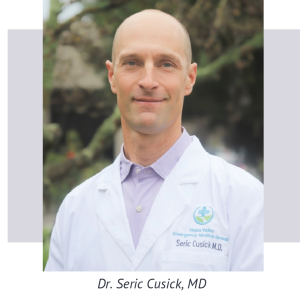 In this Q&A session, we had the opportunity to speak with Dr. Cusick, Medical Director of the Emergency Department at Sonoma Valley Hospital, to get a sense of the trends we see in the Emergency Room over the holidays and more importantly how we can work together as a community to keep one another safe.
In this Q&A session, we had the opportunity to speak with Dr. Cusick, Medical Director of the Emergency Department at Sonoma Valley Hospital, to get a sense of the trends we see in the Emergency Room over the holidays and more importantly how we can work together as a community to keep one another safe.
Q: Can you tell us a bit about yourself and the ER team at Sonoma Valley Hospital?
A: I’m a board-certified emergency physician and the medical director of our Emergency Department. Our team consists of Fellows of Emergency Medicine, all distinguished in their field. Four of the six physicians, including myself, live and raise families in Sonoma. We bring diverse specialties to our community and are deeply connected to it, being soccer coaches, parents of local school children, and neighbors.
Q: What trends do you typically see in the ER during the holidays?
A: The holidays unfortunately bring increases in substance use, intoxication, and related incidents like intoxicated driving and decoration-related injuries. We often see people hurt while setting up holiday decorations or due to intoxicated driving, which is a significant problem during this season.
Q: What are common injuries or health issues during the holiday season?
A: Aside from the aforementioned issues, outside the holidays we focus on universal bike helmet use, pedestrian and firearm safety. These are essential to prevent common injuries.
Q: How can people avoid emergency situations during the holidays?
A: Prevention is key. For instance, understanding personal limits in physical activities like decorating can prevent falls. It’s essential for seniors to assess when they need help. For vehicle safety, we advocate a zero-tolerance approach to intoxicated or distracted driving. During gatherings, everyone should look out for each other, offering alternatives to driving after drinking, for example. Addressing these issues requires changing social norms and taking community-wide responsibility.
Q: How does holiday stress impact physical health, and how can it be mitigated?
A: Moderation is crucial. It’s important to find personal time for activities that promote wellness, whether intellectual, artistic, or physical. If struggling, I encourage reaching out for help.
Q: Are there specific holiday hazards for children or seniors?
A: Yes, for children, ensure bike helmets for new bikes – there are community resources for free or low-cost helmets. Firearm safety is always a concern. Fortunately, we don’t see much uptick in poisonings as common sense safety is generally followed.
Q: Do you see an increase in travel-related incidents during the holidays?
A: Yes, especially with intoxicated driving among tourists. My advice for holiday travelers is to be mindful of consumption and consider alternatives to driving when needed.
Q: Is there an increase in mental health-related visits during the holidays?
A: Absolutely. The holidays can be challenging, and we definitely see an increase in mental health issues. My advice is to check in with loved ones, offer a non- judgmental space for conversation, and don’t hesitate to seek help if needed, including calling 911 in emergencies.
Q: What makes the Sonoma Valley Hospital ER unique to our community?
A: Our ER is staffed with highly trained physicians who are also your neighbors and friends. We are deeply invested in the community, with our children attending the same schools and playing together. We don’t just serve the community; we are part of it.
Dr. Cusick’s insights underscore the importance of community, prevention, and care in ensuring the health and safety of Sonoma Valley, especially during the holiday season.
~~~
Mental Health – Taking care of yourself over the holidays
The following resources provide a range of support options for individuals seeking help with mental health issues, especially during the holiday season when stress and mental health challenges can often be amplified.
In Sonoma, there are several mental health resources that people can access over the holidays:
1. Sonoma County Behavioral Health Division: They offer a range of services including crisis intervention, mental health services, and peer-run self-help centers. These services are available to anyone in Sonoma County experiencing a mental or emotional crisis, providing support 24/7.
• 24-Hour Access Line: For immediate assistance, individuals can call 707-565-6900 or toll-free at 800-870-8786.
• 24-Hour Suicide Prevention: This service can be accessed by calling or texting 988 or by chatting online at 988lifeline.org.
2. NAMI (National Alliance on Mental Illness) Sonoma County: NAMI Sonoma County is a non-profit organization offering free mental health education, support, and advocacy. They focus on improving the lives of those affected by mental illness and raising awareness for early intervention and treatment.
• Contact Information: For support, you can reach out to them at their website www.namisoco.org, call their warm line at 1-866-960-6264, or email them at info@namisoco.org.
• Resources Offered: NAMI Sonoma County provides various support groups such as Family to Family, Family Support Group, Connection Recovery Support Group, NAMI Basics, and Wildfire Support Group.
These resources provide a range of support options for individuals seeking help with mental health issues, especially during the holiday season when stress and mental health challenges can often be amplified.
~~~
Falls Prevention
